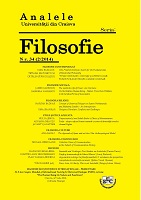IL SIGNIFICATO DELLE EMOZIONI E LA RISCOPERTA DELL’AFFETTIVITÀ NEL PENSIERO DI J.-P. SARTRE
THE SIGNIFICANCE OF THE EMOTIONS AND THE REDISCOVERY OF AFFECT IN J.-P. SARTRE’S THOUGHT
Author(s): Gabriella FarinaSubject(s): Philosophy, Logic, Philosophy of Mind
Published by: Editura Universitaria Craiova
Keywords: Sartre; rationality; affectivity; emotion; imaginary; subjectivity; freedom;
Summary/Abstract: Sartre should be credited with the mapping of new and original lines of research on emotions, on the link between logos and pathos, rational and affective, the desire to explore the universe of immediate and spontaneous ”vecu”, once distanced from the myth of monolithic and self-referential subjectivity, modeled on the Cartesian Cogito. Emotion is not a "psycho-physiological disorder", or an accidental fact, like so much of psychology believed, but a phenomenon that has a precise structure and a precise meaning: If a person is moved, this means something. For Sartre emotion is a passion but also an act of freedom; it is a free and creative act; a daring act of freedom that imposes itself on reasoning. The role of emotions is acknowledged and reaffirmed also in Sartre's theatre and in particular reflects on the emotional and imaginary dimension that the actor creates on stage. A classic example is the pièce Les Troyennes, by most critics considered a drama of emotions.
Journal: ANALELE UNIVERSITĂȚII DIN CRAIOVA. SERIA FILOSOFIE
- Issue Year: 1/2014
- Issue No: 33
- Page Range: 5-12
- Page Count: 8
- Language: Italian

